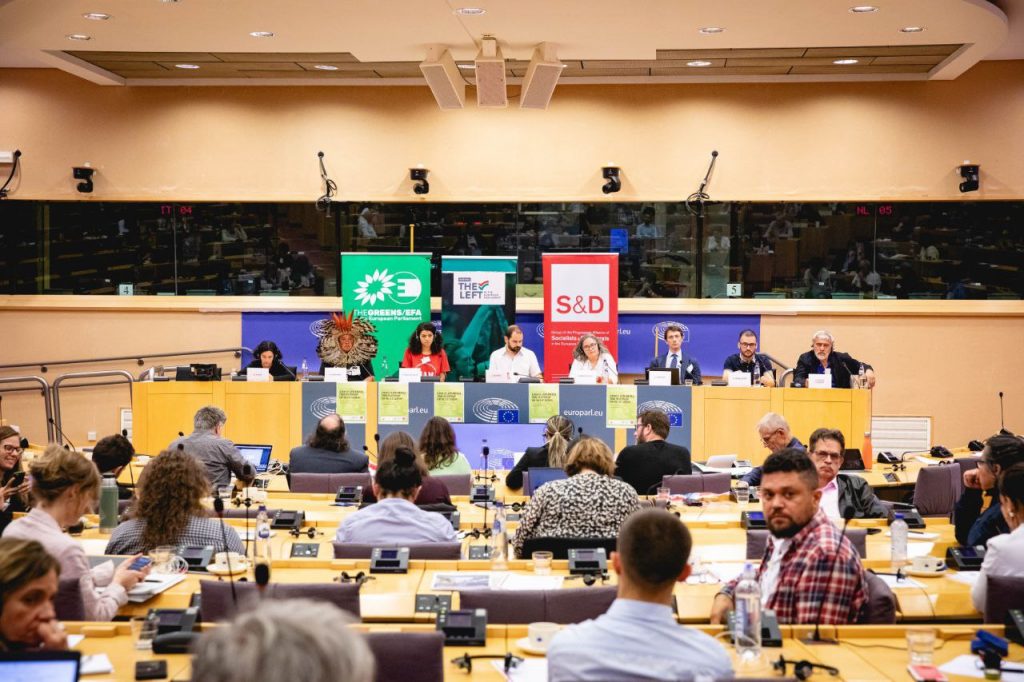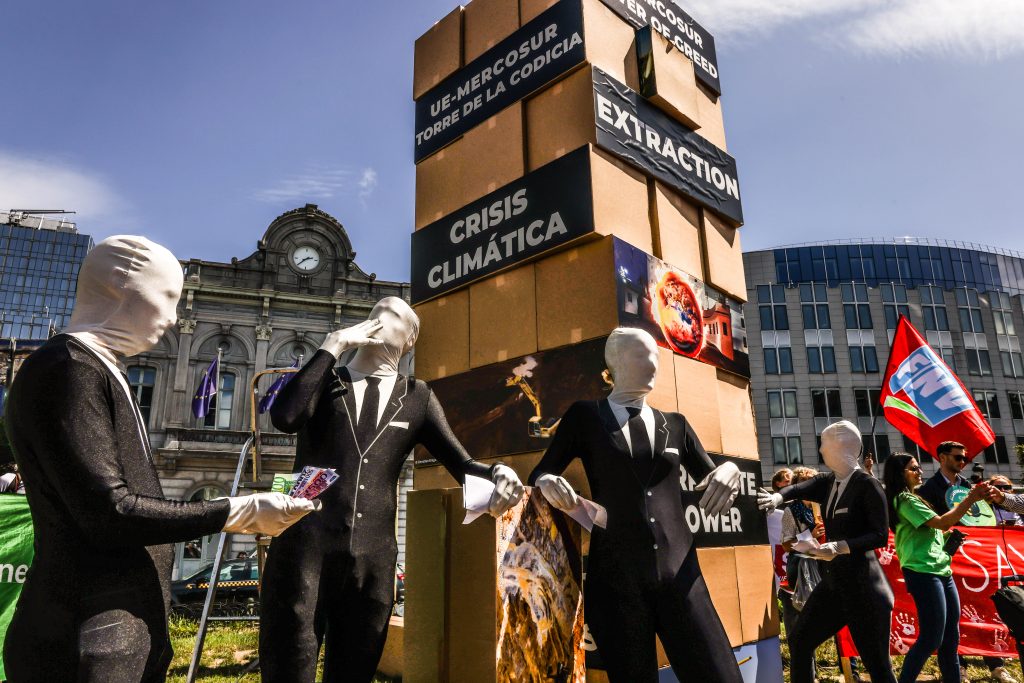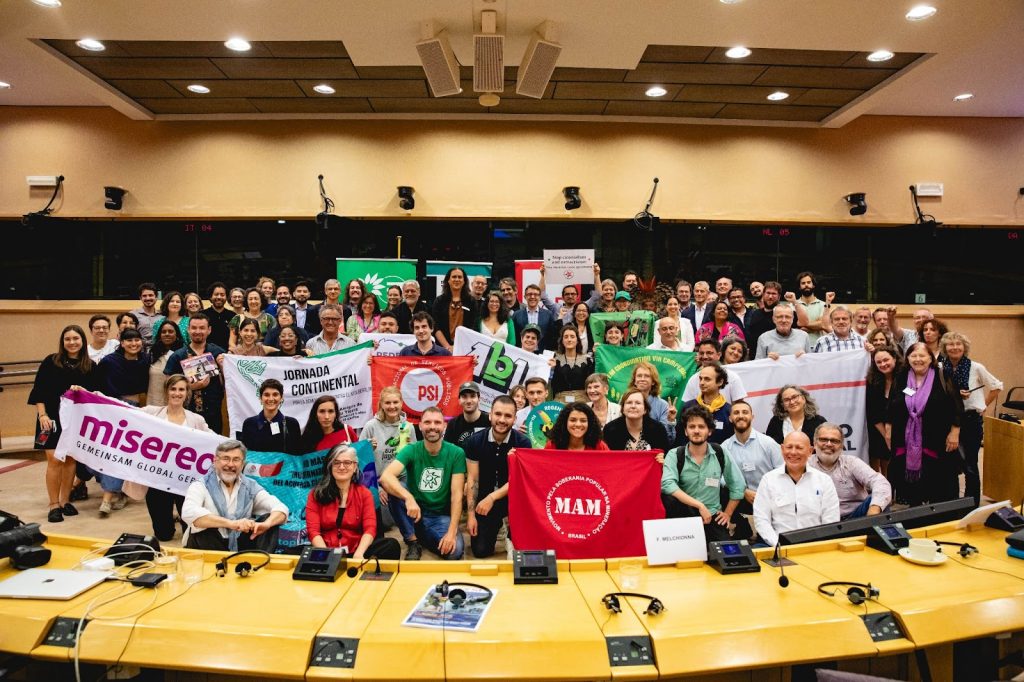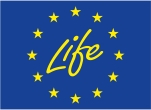On 17 and 18 July, heads of state from Latin America, the Caribbean, and the EU met in Brussels for the first joint summit (called EU-CELAC) in eight years. They exchanged, among other issues, on controversial trade agreements such as the ones between the EU and Mexico, Chile, and the Mercosur.
Parallel to the summit, South American and European activists from more than 50 civil society organisations gathered in Brussels to call on leaders to stop unjust trade agreements and change the current EU trade and investment system.
Here’s a look back at two days of actions, and discussions:
Conference in the European Parliament: A new EU-Latin America trade relationship for the 21st Century
On Monday 17th, a conference supported by MEPs from the Greens/EFA, The Left and Socialists and Democrats Groups was held at the European Parliament.
Representatives of social movements, farmers’ organisations, trade unions and members of the European Parliament, as well as parliamentarians and governmental representatives from Latin America, raised their concerns about the impacts that these agreements are having, or could have on climate, human rights, employment, public services, biodiversity and animal welfare
Rich and instructive discussions were focused on the lessons learned from 20 years of EU trade agreements in Latin America and the Caribbean, and on the toxic free trade agreement currently being negotiated between the EU and Mercosur. Finally, alternatives to the current trade regime were addressed.
Julie Zalcman, trade campaigner at Friends of the Earth Europe concluded the conference by quoting the Brazilian trade unionist Chico Mendes:
“The EU-Mercosur, EU-Mexico and EU-Chile trade agreements are based on an outdated trading system that sacrifices planetary boundaries and human rights for the benefit of voracious multinational companies. These agreements fuel crises and lock us into asymmetrical relationships, an unjust and unsustainable system.
No “joint instrument”, no chapter on trade and sustainable development, can compensate for the destructive nature of these trade agreements that do not guarantee any protection of human rights and the environment. These free-trade agreements are heading us straight for disaster. That is why we reject them.”

Watch the whole conference below (interpretation available in English, Spanish, Portuguese and French).
EU-Mercosur Greed Jenga Tower
After the conference, activists built and tore down a giant three meters high “EU-Mercosur Greed Jenga Tower” in front of the European Parliament in Brussels. This tower symbolises the impacts of the EU-Mercosur deal on the environment, human rights, workers, small farmers, and animal welfare. Five people disguised as business representatives tried to protect the Jenga Tower from EU-Mercosur greed, exposing the truth that this agreement primarily serves the interests of big business.
Activists called on policy-makers from both sides of the Atlantic to stop the ratification for the sake of people and the planet.

Civil society public event: “Building a Just Transition to a Sustainable Future in Latin America”
Friends of the Earth Europe, the European Environmental Bureau, the EU-LAT Network, and 8 other CSOs organised a conference on a just transition in Latin America. The aim of the discussions was to broaden the discourse on trade justice to encompass other crucial aspects necessary for a just transition in Latin American and Caribbean countries. The various South American and European speakers addressed issues such as the rights of indigenous people rights, extractivism in Latin America, human rights, and the shrinking space of civil society.

Strategy meeting of the Transatlantic coalition for trade justice, organised by the Seattle to Brussels network
Representatives of organisations from South America and Europe met f during one day to exchange and build their strategy against unfair trade agreements.

More than 450 organisations are calling for a fairer trading system that respects the planet and people. This strategy meeting has strengthened the pre-existing ties between South American and European civil society organisations and confirmed our common ambitions for a new era of just and sustainable cooperation between our two regions.
More information on the EU-Mercosur deal
- Our legal analysis of the ‘green’ annex of the EU-Mercosur deal here
- Our three fact-sheets on human rights and the environment in Brazil:

This publication is co-funded by the European Union. Views and opinions expressed are however those of the author(s) only and do not necessarily reflect those of the European Union or CINEA. Neither the European Union nor the granting authority can be held responsible for them
Related Content
We think you’d also like:

Stop the EU-Mercosur trade deal
The EU is close to finalising a climate-wrecking trade deal with Brazil, Argentina, Paraguay and Uruguay – known collectively as Mercosur. But there’s still time to stop it.







